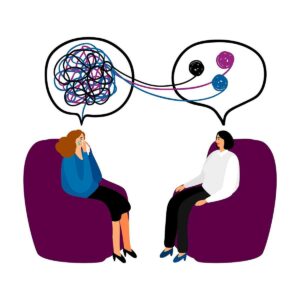If you are one of the millions of people who suffer from bipolar disorder, you know how difficult it can be to manage your condition. The good news is that there are treatments available that can help you live a better life. One of those treatments is psychotherapy. In this blog post, we will discuss the benefits of psychotherapy for bipolar disorder and how it can help you manage your condition.
Contents
What Is Psychotherapy?
 Psychotherapy is a talking therapy that involves a trained mental health professional helping you to overcome your challenges by talking about them. It can help you make positive changes in your life, improve relationships, and recover from bipolar disorder.
Psychotherapy is a talking therapy that involves a trained mental health professional helping you to overcome your challenges by talking about them. It can help you make positive changes in your life, improve relationships, and recover from bipolar disorder.
Psychotherapy is also called counseling, therapy, or talk therapy. It can be done in individual sessions, with family members or friends, or in groups. This is a relatively new way to treat bipolar disorder, but it has been an effective treatment for many people.
Also, one research has found that people who receive psychotherapy for bipolar disorder have less chance of relapse than those who do not accept any treatment. Because therapies are always changing, it is important to find a therapist who you trust and feel comfortable with so that you can get the most out of your sessions.
Therefore, it is important to seek help from a mental health professional if you think you may have bipolar disorder. Who knows this therapy is all you might need to recover from your condition!
What Are The Different Types Of Psychotherapy?
Psychotherapy is a field that is continuously growing and evolving with time. So there is a variety of types of psychotherapy from which you can choose as per your convenience. Let’s discuss some common types of psychotherapy for bipolar disorder. These include:
Individual therapy
It is the most common type of therapy in which you meet with a therapist one-on-one to discuss your thoughts, feelings, and behaviors. The therapist will help you understand your bipolar disorder and give you tools to cope with the symptoms.
Group therapy
This is one type of psychotherapy that can be very effective for bipolar disorder. Group therapy is a form of therapy where you meet with other people who also have bipolar disorder. This can be a great way to learn about how others are dealing with the condition and to share information. It can also help you feel less alone and more understood.
Couples therapy
Sometimes people can benefit from couples therapy even if they are not currently in a relationship. This is because bipolar disorder can put a strain on even the strongest of relationships. Couples therapy can help people learn how to communicate better and understand each other’s needs.
Family therapy
 Another type of psychotherapy that can be helpful for people with bipolar disorder is family therapy. In family therapy, you meet with a therapist along with your spouse, partner, or other family members. The therapist helps you all communicate better and understand how bipolar disorder affects your relationships.
Another type of psychotherapy that can be helpful for people with bipolar disorder is family therapy. In family therapy, you meet with a therapist along with your spouse, partner, or other family members. The therapist helps you all communicate better and understand how bipolar disorder affects your relationships.
These are just a few of the ways that psychotherapy can help address bipolar disorder. If you think you might benefit from therapy, talk to your doctor or mental health professional. They can help you to choose the right method for you.
How Does Psychotherapy For Bipolar Disorder Work?
The working of any therapy type is a vital concern, be it for bipolar disorder or any other sort of ailment. Psychotherapy is commonly understood to be talking therapy. It involves open communication between the therapist and the patient to get a better understanding of their thoughts, feelings, and emotions.
The aim is to help the patient develop healthier coping mechanisms and thought patterns. There are different types of psychotherapy, and the type that will be most effective depends on the individual. Let’s understand with an example how psychotherapy for bipolar disorder helps.
If you have bipolar disorder, you will experience periods of extreme highs and lows. These are called manic and depressive episodes. During a manic episode, you may feel very happy, energized, and productive. A depressive episode, on the other hand, can make you feel very sad, hopeless, and worthless. You may lose interest in things that you used to enjoy and may have trouble sleeping or eating.
Psychotherapy can help you understand your thoughts and feelings during these episodes. It can also help you learn how to control them. For example, if you are feeling very low, your therapist may help you understand why you are feeling this way. They may also teach you some coping mechanisms to deal with the symptoms.
Therefore, it is an effective treatment for bipolar disorder. If you are struggling with bipolar disorder, psychotherapy may be a good option for you.
What Techniques Are Used In Psychotherapy?
 There are different types of psychotherapy, but all aim to help a person identify and change negative thinking and behavior patterns. Some common techniques that psychotherapy involves:
There are different types of psychotherapy, but all aim to help a person identify and change negative thinking and behavior patterns. Some common techniques that psychotherapy involves:
- Cognitive behavioral therapy
- Interpersonal therapy
- Family-focused therapy
- Dialectical behavioral therapy
- Psychodynamic therapy
Cognitive behavioral therapy
Cognitive behavioral therapy (CBT) is a type of psychotherapy that helps you understand your thoughts and feelings, and how they affect your behaviors. CBT can help you learn new skills to manage your bipolar disorder. It is usually done in individual sessions, but can also be done in group therapy.
Interpersonal therapy
Interpersonal therapy (IPT) is a type of psychotherapy that focuses on your relationships with other people. IPT can help you understand and manage your bipolar disorder. The purpose of IPT is to help you improve your relationships, and learn new skills to manage your bipolar disorder. More often, IPT psychotherapy is the most successful when done in group therapy.
Family-focused therapy
Family-focused therapy (FFT) is a type of psychotherapy that helps you and your family members understand and manage bipolar disorder. FFT can help you and your family members to identify and change negative patterns of interaction and communicate more effectively. It is typically conducted in weekly sessions. Each session lasts about 90 minutes, and the number of sessions required varies depending on the needs of the family.
Dialectical behavioral therapy
DBT is a cognitive-behavioral treatment that was originally developed to treat borderline personality disorder. It has since been found to be effective in treating a range of other mental health conditions, including bipolar disorder. It focuses on helping people learn to cope with difficult emotions and situations by teaching them skills such as mindfulness, distress tolerance, and emotional regulation.
Psychodynamic therapy
This is a form of therapy that explores the underlying causes of your condition. It can help you understand how your past experiences might be affecting your current moods and behaviors. For instance, this technique might be used to examine how early childhood experiences might be impacting your current relationship with a partner.
So these are some of the different techniques of psychotherapy that can be used to help address bipolar disorder. As you can see, each type of therapy has its own unique set of benefits. If you or a loved one is struggling with bipolar disorder, don’t hesitate to reach out to a mental health professional to explore which type of therapy would be most beneficial.
What Are The Benefits?
 The benefits of psychotherapy for bipolar disorder are many. In addition to providing a space to talk about your symptoms and experiences, therapy can also help you develop coping mechanisms, understand your triggers, and work on building a support system. Therapy can also help you manage medications and make lifestyle changes that can improve your overall health.
The benefits of psychotherapy for bipolar disorder are many. In addition to providing a space to talk about your symptoms and experiences, therapy can also help you develop coping mechanisms, understand your triggers, and work on building a support system. Therapy can also help you manage medications and make lifestyle changes that can improve your overall health.
One of the most important benefits of therapy for bipolar disorder is that it can help you develop a better understanding of your condition. With this knowledge, you can start to identify your triggers and learn how to manage them. You’ll also gain insight into your own behaviors and thought patterns, which can help make future decisions.
Therapy can also provide a space to talk about your experiences with bipolar disorder in a safe and non-judgmental environment. This can be incredibly beneficial, as it can help you feel more comfortable talking about the condition with friends and family. In addition, therapy can help you develop a support system for people who understand what you’re going through.
If you’re considering therapy for bipolar disorder, it’s important to find a therapist who you trust and feel comfortable with. It’s also important to make sure that the therapist is familiar with treating bipolar disorder.
What Other Issues Can Psychotherapy Treat?
As therapies are designed to work on specific areas, it can be difficult to find one that will address all the needs of a person with bipolar disorder. That’s why it’s important to consult with a mental health professional to get an accurate diagnosis and develop a treatment plan that may include psychotherapy, medication, and other interventions.
Psychotherapy can help people with other conditions as well that might occur in comorbidity with bipolar disorder, such as:
- Anxiety disorders
- Substance abuse disorders
- Eating disorders
- Depression
- Attention-deficit/hyperactivity disorder (ADHD)
- Post-traumatic stress disorder (PTSD)
- Psychosis
- OCD and other personality disorders
While there is no one-size-fits-all solution, working with a therapist can help you to understand your diagnosis, develop healthy coping mechanisms, and set goals for managing your symptoms. If you’re struggling with bipolar disorder, don’t hesitate to reach out for help.
If you think you might benefit from psychotherapy, talk to your doctor or mental health professional about finding a therapist who can help you. There are many different types of therapy, so it’s important to find one that’s a good fit for you and your needs.
Are There Any Risks?
 Commonly, therapies are considered the safest option when addressing bipolar disorder, however, there are still some risks. The most common risks associated with psychotherapy are:
Commonly, therapies are considered the safest option when addressing bipolar disorder, however, there are still some risks. The most common risks associated with psychotherapy are:
- Feeling worse before feeling better. Sometimes, when exploring difficult topics in therapy, people feel worse before they feel better. This is called “regression.”
- Experiencing uncomfortable feelings and emotions. To get better, you will need to face some difficult truths about yourself, which can be painful.
- Opening up about personal details and secrets. To get the most out of therapy, you will need to be honest and open about your thoughts, feelings, and experiences. This can feel scary or difficult.
It is important to remember that these risks are temporary and manageable with the help of a qualified therapist. If you are considering therapy for bipolar disorder, be sure to find a therapist that is suitable for you. You should keep in mind a few things while finding a therapist, for example:
- What are their qualifications?
- Do they have experience working with people with bipolar disorder?
- Do they have a good understanding of the latest research on bipolar disorder?
- Are they someone you feel comfortable talking to?
If you answered yes to these questions, then you have found a good therapist. Now you do not need to worry about the risks because you will be in good hands.
Conclusion
The bottom line is that psychotherapy for bipolar disorder is an effective treatment and comes with minimal risks. If you are considering therapy, be sure to find a qualified therapist that you feel comfortable talking to. With the help of a therapist, you will be able to manage your bipolar disorder and live a happy, healthy life.
Moreover, it is important to keep in mind that bipolar disorder is a lifelong condition. Even if you are feeling well, it is important to continue to see your therapist and take your medication as prescribed. Otherwise, it can be easy to relapse.
For more tips and guidance, you can reach out to Therapy Mantra. The team of professional counselors is more than happy to help you in your journey to recovery. Contact us today to learn more about our services. You can also book an online therapy session or download our free Android or iOS app.


